Lib for the new LCD Display with ILI9341 controller
Dependents: TFT_Test_ILI9341 touch_piirto TFT_banggood TFT_Test_ILI9341-a-fish ... more
Lib for 320*240 Pixel Color LCD with ILI9341 controller. Based on MI0283QT-9 datasheet. The lib is based on the http://mbed.org/cookbook/SPI-driven-QVGA-TFT code for the older LCD board.
The lib is using the 4 line serial data interface. The IM pins have to be set to 1110 (IM3-IM0) to use this mode. It use the SPI hardware.
I have started to speed up the lib with using DMA and direct SPI programming. To do this I have to split the code for the different platforms. To prevent unreadable code with a lot of #ifdef... I have create a new file. The #ifdef definition around is switching between the platforms. I will add the other Nucleo platforms. If you want to support others - see ..._NUCLEO.cpp , port and send me the code to add.
Display 1
If you use the TFT Proto from MikroElektronika http://www.mikroe.com/eng/products/view/474/tft-proto-board/
you have to connect : 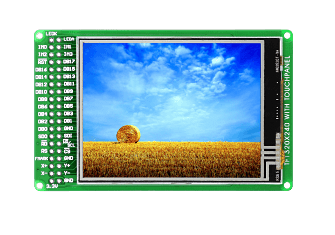
| MBED | Display |
|---|---|
| + 3,3V | 3,3V |
| GND | GND |
| mosi | SDI |
| miso | SDO |
| sck | RS |
| cs | CS |
| reset | RST |
| dc | WR/SCL |
| GND | IM0 |
| +3,3V | IM1 IM2 IM3 |
| GND | DB0 - DB17 |
| GND | RD |
The backlite LED need a resistor to limit the current. You can use two 10R resistors parallel to get 5R driven by 3.3V.
Display 2
Watterott is also selling a ILI9341 based QVGA TFT : http://www.watterott.com/de/MI0283QT-2-Adapter
Unfortunately this adapter is set to 9 bit SPI mode via the mode pins IM0-IM3. If you want to patch this - like I have done - you have to desolder the TFT from the pcb to cut some traces. This is a flexible print. Only for people with soldering skills ! You also have to get access to pin 36 for the dc signal. Cut the GND connection. You can use the level converter used for the LCD_LED signal. Mosfet Q1 can be driven with a logic signal without converter. Watterott will change this in a future revision.
/media/uploads/dreschpe/mi0283qt_v12_patch.pdf
Display 3
There are inexpensive displays from china. You can get them at: http://www.banggood.com/2_2-Inch-Serial-TFT-SPI-LCD-Screen-Module-HD-240-X-320-5110-Compatible-p-912854.html The board has also a SD card connector at the backside, but no touch.
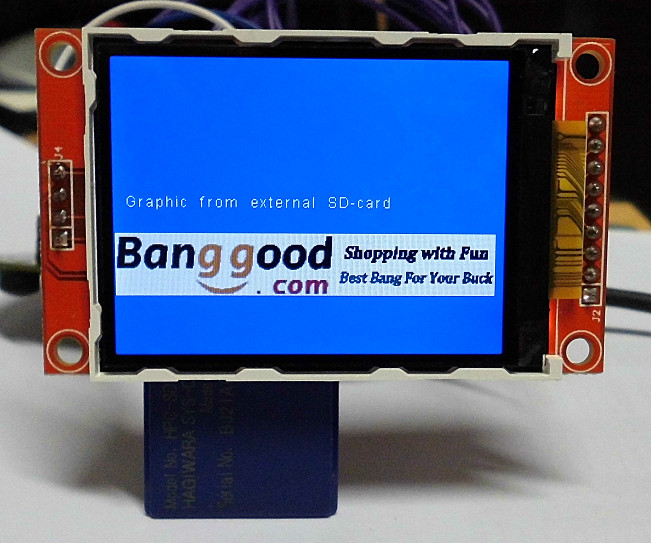
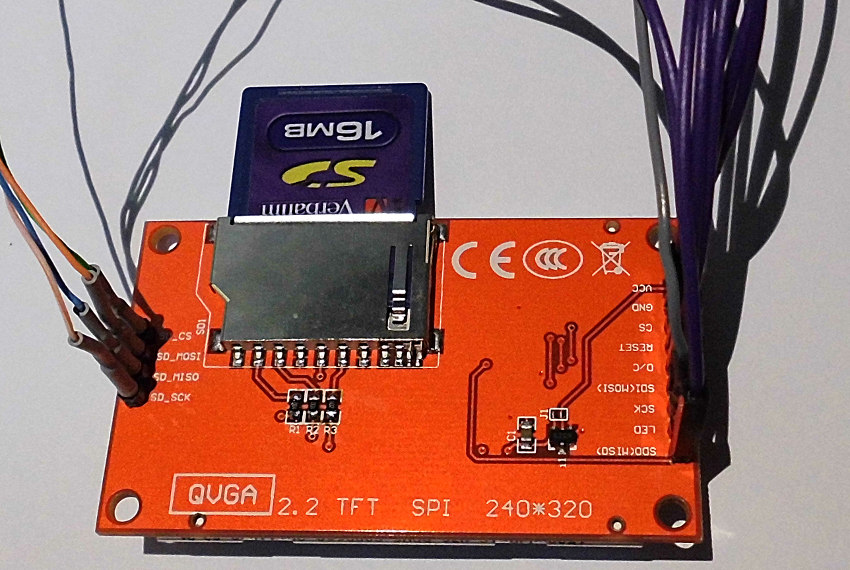
The board can be used without modification. Connect VCC with 5V USB out. There is a voltage regulator on board. To use the SD card simply import the SDFileSystem and connect it to the second SPI.
Fonts
How to get nice looking fonts ?
To print characters to a graphic screen we need a font. To code a font by paper is ok for a small lcd, but for a 320*240 pixel display we need bigger fonts. A 12*12 pixel font is readable, but a lot of work to construct.
Fonts can be made with the GLCD Font Creator also from http://www.mikroe.com .
With this program you can load a window font and convert it into a c-array. To use this Font with my lib you have to add 4 parameter at the beginning of the font array. - the number of byte / char - the vertial size in pixel - the horizontal size in pixel - the number of byte per vertical line (it is vertical size / 8 ) You also have to change the array to char[]. After that you can switch between different fonts with set_font(unsigned char* font); The horizontal size of each character is also stored in the font. It look better if you use bigger fonts or italic. The letter M is wider than a l.
Here are some Fonts from me : http://mbed.org/users/dreschpe/code/TFT_fonts/
The small made for the mbed lab board : http://mbed.org/users/dreschpe/code/LCD_fonts/
And from Peter Holzleitner : http://mbed.org/users/pholzleitner/code/SourceCodePro31-SB/
Text commands :
You can use the claim() function to redirect the output to stdout or stderr to the TFT. After claim(stdout) you can simply use the printf function to print to the TFT.
- locate(x,y); function is used to setup the cursor position. x,y are the pixel position. This was changed from row,column in older lib !
There are two parameter to setup the color of the text :
- background(color);
- foreground(color); All color are 16bit: R5 G6 B5.
- set_orientation(); This command select one of the 4 directions to use the display. This command is also working on the graphical commands.
Graphics
Graphic commands :
- cls(); Fill the screen with background color
- pixel(x,y,color); set a single pixel at x,y with color
- line(x0,y0,x1,y1,color); draw a line from x0,y0 to x1,y1 with color
- rect(x0,y0,x1,y1,color); draw a rectangle x0,y0 to x1,y1 with color
- fillrect(x0,y0,x1,y1,color); draw a filled rectangle
- circle( x0,y0,radius ,color); draw a circle around x0,y0 with radius
- fillcircle(x0,y0,radius ,color); draw a filled circle around x0,y0 with radius
- Bitmap(x0,y0,w,h,*bitmap); paint a bitmap with width w and high h starting at x0,y0 (upper left corner)
- BMP_16(x0,y0,*bmp); paint a bmp file out of the internal drive or a SD-card
How to transfer a grafic to the mbed ?
The hard way - but fast to load :
Load from mbed flash. It consume a lot of flash memory. To construct a bitmap array we can use gimp. http://www.gimp.org/ Load a image (edit and resize) and export it as BMP. You have to select the option 16 bit R5 G6 B5 !
To convert this file into a c-array you can use the hex-editor winhex. (http://www.x-ways.net/winhex/index-m.html) The eval version can handle the small files.
We don`t need the bmp header. Mark the data starting at offset 0x46 to the end of file.
Use "edit -> copy block -> C Source" to export this data as C array. Paste the data into a C file into the mbed compiler.
The editor will generate a array of char[]. To use 16 bit DMA on this we have to put a __align(2) in front of the definition.
To put it into Flash we change it to static const unsigned char bmp[]{...}
__align(2)
static const unsigned char bmp[]{
0xCB, 0x5A, 0x5C, 0xE7,....
};
The easy way - but slower to load:
With the BMP_16 command we can load a picture out of the internal drive or a SD-card to the display.
- BMP_16(x0,y0,"/local/test.bmp"); paint test.bmp out of the internal drive to x0, y0
- BMP_16(x0,y0,"/sd/test.bmp"); paint test.bmp out of a external SD-card to x0, y0
simply copy test.bmp to the mbed usb drive or the SD-card. The bmp has to be saved with the options 16 bit R5 G6 B5 ! You can use the program gimp to convert pictures into the 16 bit bmp format.
sample code
http://mbed.org/users/dreschpe/code/TFT_Test_ILI9341/
// example to test the TFT Display
// Thanks to the GraphicsDisplay and TextDisplay classes
// test2.bmp has to be on the mbed file system
#include "stdio.h"
#include "mbed.h"
#include "SPI_TFT_ILI9341.h"
#include "string"
#include "Arial12x12.h"
#include "Arial24x23.h"
#include "Arial28x28.h"
#include "font_big.h"
extern unsigned char p1[]; // the mbed logo
DigitalOut LCD_LED(p21); // the Watterott display has a backlight switch
DigitalOut CS_Touch(p15); // disable the touch controller on the Watterott display
// the TFT is connected to SPI pin 5-7
SPI_TFT_ILI9341 TFT(p5, p6, p7, p8, p9, p10,"TFT"); // mosi, miso, sclk, cs, reset, dc
int main()
{
int i;
LCD_LED = 1; // backlight on
CS_Touch = 1;
TFT.claim(stdout); // send stdout to the TFT display
//TFT.claim(stderr); // send stderr to the TFT display
TFT.set_orientation(1);
TFT.background(Black); // set background to black
TFT.foreground(White); // set chars to white
TFT.cls(); // clear the screen
//first show the 4 directions
TFT.set_orientation(0);
TFT.background(Black);
TFT.cls();
TFT.set_font((unsigned char*) Arial12x12);
TFT.locate(0,0);
printf(" Hello Mbed 0");
TFT.set_orientation(1);
TFT.locate(0,0);
printf(" Hello Mbed 1");
TFT.set_orientation(2);
TFT.locate(0,0);
printf(" Hello Mbed 2");
TFT.set_orientation(3);
TFT.locate(0,0);
printf(" Hello Mbed 3");
TFT.set_orientation(1);
TFT.set_font((unsigned char*) Arial24x23);
TFT.locate(50,100);
TFT.printf("TFT orientation");
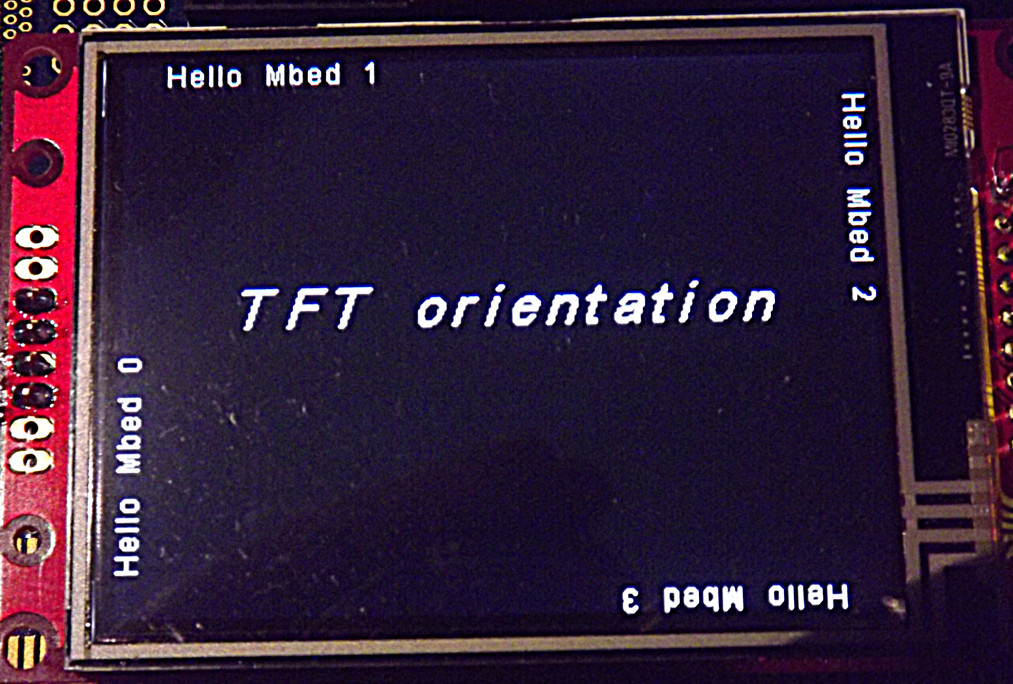
// draw some graphics
TFT.cls();
TFT.set_font((unsigned char*) Arial24x23);
TFT.locate(100,100);
TFT.printf("Graphic");
TFT.line(0,0,100,0,Green);
TFT.line(0,0,0,200,Green);
TFT.line(0,0,100,200,Green);
TFT.rect(100,50,150,100,Red);
TFT.fillrect(180,25,220,70,Blue);
TFT.circle(80,150,33,White);
TFT.fillcircle(160,190,20,Yellow);
double s;
for (i=0; i<320; i++) {
s =20 * sin((long double) i / 10 );
TFT.pixel(i,100 + (int)s ,Red);
}
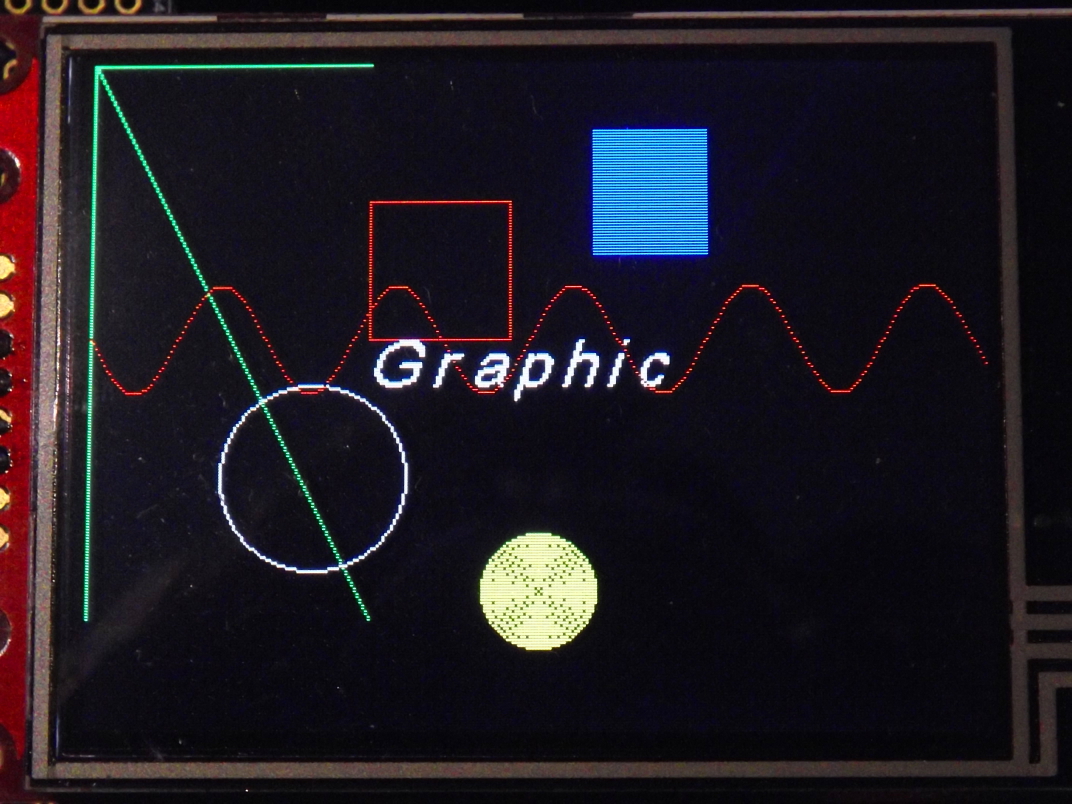
// bigger text
TFT.foreground(White);
TFT.background(Blue);
TFT.cls();
TFT.set_font((unsigned char*) Arial24x23);
TFT.locate(0,0);
TFT.printf("Different Fonts :");
TFT.set_font((unsigned char*) Neu42x35);
TFT.locate(0,30);
TFT.printf("Hello Mbed 1");
TFT.set_font((unsigned char*) Arial24x23);
TFT.locate(20,80);
TFT.printf("Hello Mbed 2");
TFT.set_font((unsigned char*) Arial12x12);
TFT.locate(35,120);
TFT.printf("Hello Mbed 3");
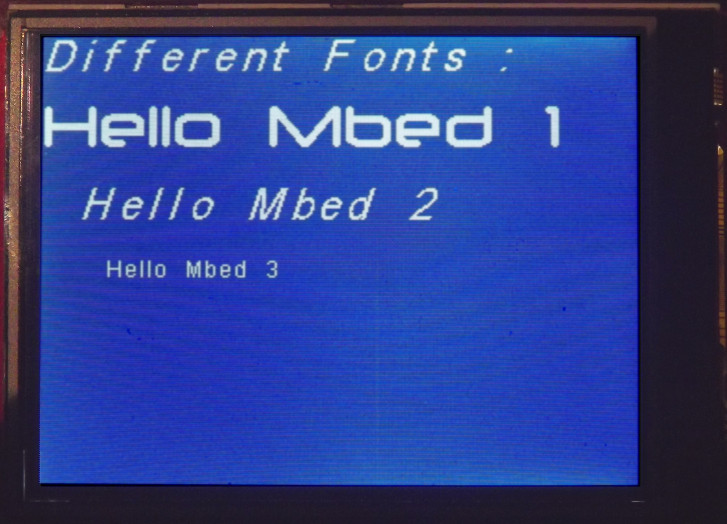
// mbed logo from flash
// defined in graphics.c
//__align(4)
//unsigned char p1[18920] = {
//0xFF, 0xFF, 0xFF, 0xFF, 0xFF, 0xFF, ....
//
TFT.background(Black);
TFT.cls();
TFT.locate(10,10);
TFT.printf("Graphic from Flash");
TFT.Bitmap(90,90,172,55,p1);
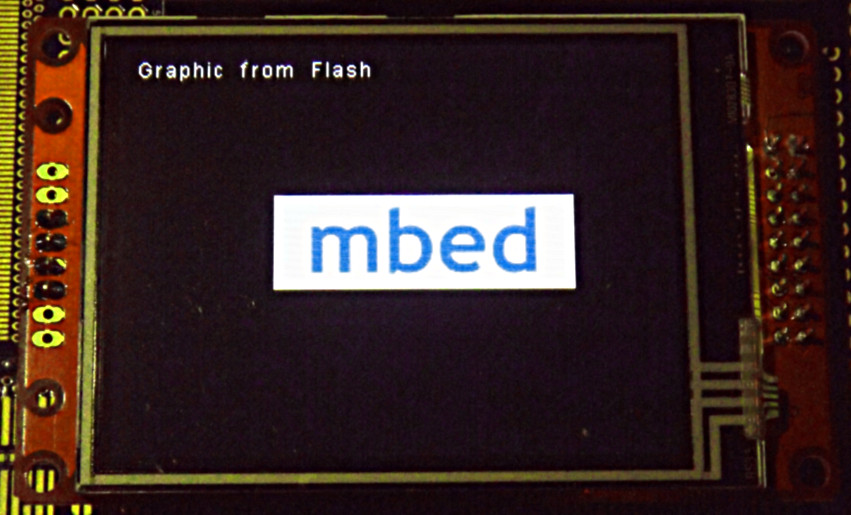
#include "SDFileSystem.h"
// connect a sd-card to the second spi or use the local filesystem of the LPC
SDFileSystem sd(p11, p12, p13, p14, "sd"); // mosi,miso,sck,cs
TFT.cls();
TFT.locate(10,110);
TFT.printf("Graphic from external SD-card");
int err = TFT.BMP_16(1,140,"/sd/test.bmp"); // load test.bmp from external SD-card
TFT.locate(10,120);
if (err != 1) TFT.printf(" - Err: %d",err);
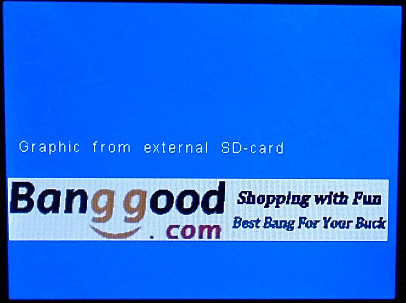
SPI_TFT_ILI9341.cpp
- Committer:
- dreschpe
- Date:
- 2014-06-25
- Revision:
- 13:b2b3e5430f81
- Parent:
- 12:98cc5c193ecd
File content as of revision 13:b2b3e5430f81:
/* mbed library for 240*320 pixel display TFT based on ILI9341 LCD Controller
* Copyright (c) 2013 Peter Drescher - DC2PD
*
* THE SOFTWARE IS PROVIDED "AS IS", WITHOUT WARRANTY OF ANY KIND, EXPRESS OR
* IMPLIED, INCLUDING BUT NOT LIMITED TO THE WARRANTIES OF MERCHANTABILITY,
* FITNESS FOR A PARTICULAR PURPOSE AND NONINFRINGEMENT. IN NO EVENT SHALL THE
* AUTHORS OR COPYRIGHT HOLDERS BE LIABLE FOR ANY CLAIM, DAMAGES OR OTHER
* LIABILITY, WHETHER IN AN ACTION OF CONTRACT, TORT OR OTHERWISE, ARISING FROM,
* OUT OF OR IN CONNECTION WITH THE SOFTWARE OR THE USE OR OTHER DEALINGS IN
* THE SOFTWARE.
*/
// 12.06.13 fork from SPI_TFT code because controller is different ...
// 14.07.13 Test with real display and bugfix
// 18.10.13 Better Circle function from Michael Ammann
// 22.10.13 Fixes for Kinetis Board - 8 bit spi
// 26.01.14 Change interface for BMP_16 to also use SD-cards
// 23.06.14 switch back to old Version - fork for L152
// 24.06.14 Add compiler flag for optimized L152 version
// 25.06.14 Add optimized F103 version
// exclude this file for platforms with optimized version
#if defined TARGET_NUCLEO_L152RE || defined TARGET_NUCLEO_F103RB || defined TARGET_LPC1768
// this platforms are supported by special version in different source file
#else
#include "SPI_TFT_ILI9341.h"
#include "mbed.h"
#define BPP 16 // Bits per pixel
//extern Serial pc;
//extern DigitalOut xx; // debug !!
SPI_TFT_ILI9341::SPI_TFT_ILI9341(PinName mosi, PinName miso, PinName sclk, PinName cs, PinName reset, PinName dc, const char *name)
: GraphicsDisplay(name), SPI(mosi, miso, sclk,NC), _cs(cs), _reset(reset), _dc(dc)
{
orientation = 0;
char_x = 0;
SPI::format(8,3); // 8 bit spi mode 3
SPI::frequency(10000000); // 10 Mhz SPI clock
tft_reset();
}
int SPI_TFT_ILI9341::width()
{
if (orientation == 0 || orientation == 2) return 240;
else return 320;
}
int SPI_TFT_ILI9341::height()
{
if (orientation == 0 || orientation == 2) return 320;
else return 240;
}
void SPI_TFT_ILI9341::set_orientation(unsigned int o)
{
orientation = o;
wr_cmd(0x36); // MEMORY_ACCESS_CONTROL
switch (orientation) {
case 0:
SPI::write(0x48);
break;
case 1:
SPI::write(0x28);
break;
case 2:
SPI::write(0x88);
break;
case 3:
SPI::write(0xE8);
break;
}
_cs = 1;
WindowMax();
}
// write command to tft register
void SPI_TFT_ILI9341::wr_cmd(unsigned char cmd)
{
_dc = 0;
_cs = 0;
SPI::write(cmd); // mbed lib
_dc = 1;
}
void SPI_TFT_ILI9341::wr_dat(unsigned char dat)
{
SPI::write(dat); // mbed lib
}
// the ILI9341 can read
char SPI_TFT_ILI9341::rd_byte(unsigned char cmd)
{
char r;
_dc = 0;
_cs = 0;
SPI::write(cmd); // mbed lib
_cs = 1;
r = SPI::write(0xff);
_cs = 1;
return(r);
}
// read 32 bit
int SPI_TFT_ILI9341::rd_32(unsigned char cmd)
{
int d;
char r;
_dc = 0;
_cs = 0;
d = cmd;
d = d << 1;
SPI::format(9,3); // we have to add a dummy clock cycle
SPI::write(d);
SPI::format(8,3);
_dc = 1;
r = SPI::write(0xff);
d = r;
r = SPI::write(0xff);
d = (d << 8) | r;
r = SPI::write(0xff);
d = (d << 8) | r;
r = SPI::write(0xff);
d = (d << 8) | r;
_cs = 1;
return(d);
}
int SPI_TFT_ILI9341::Read_ID(void){
int r;
r = rd_byte(0x0A);
r = rd_byte(0x0A);
r = rd_byte(0x0A);
r = rd_byte(0x0A);
return(r);
}
// Init code based on MI0283QT datasheet
void SPI_TFT_ILI9341::tft_reset()
{
_cs = 1; // cs high
_dc = 1; // dc high
_reset = 0; // display reset
wait_us(50);
_reset = 1; // end hardware reset
wait_ms(5);
wr_cmd(0x01); // SW reset
wait_ms(5);
wr_cmd(0x28); // display off
/* Start Initial Sequence ----------------------------------------------------*/
wr_cmd(0xCF);
SPI::write(0x00);
SPI::write(0x83);
SPI::write(0x30);
_cs = 1;
wr_cmd(0xED);
SPI::write(0x64);
SPI::write(0x03);
SPI::write(0x12);
SPI::write(0x81);
_cs = 1;
wr_cmd(0xE8);
SPI::write(0x85);
SPI::write(0x01);
SPI::write(0x79);
_cs = 1;
wr_cmd(0xCB);
SPI::write(0x39);
SPI::write(0x2C);
SPI::write(0x00);
SPI::write(0x34);
SPI::write(0x02);
_cs = 1;
wr_cmd(0xF7);
SPI::write(0x20);
_cs = 1;
wr_cmd(0xEA);
SPI::write(0x00);
SPI::write(0x00);
_cs = 1;
wr_cmd(0xC0); // POWER_CONTROL_1
SPI::write(0x26);
_cs = 1;
wr_cmd(0xC1); // POWER_CONTROL_2
SPI::write(0x11);
_cs = 1;
wr_cmd(0xC5); // VCOM_CONTROL_1
SPI::write(0x35);
SPI::write(0x3E);
_cs = 1;
wr_cmd(0xC7); // VCOM_CONTROL_2
SPI::write(0xBE);
_cs = 1;
wr_cmd(0x36); // MEMORY_ACCESS_CONTROL
SPI::write(0x48);
_cs = 1;
wr_cmd(0x3A); // COLMOD_PIXEL_FORMAT_SET
SPI::write(0x55); // 16 bit pixel
_cs = 1;
wr_cmd(0xB1); // Frame Rate
SPI::write(0x00);
SPI::write(0x1B);
_cs = 1;
wr_cmd(0xF2); // Gamma Function Disable
SPI::write(0x08);
_cs = 1;
wr_cmd(0x26);
SPI::write(0x01); // gamma set for curve 01/2/04/08
_cs = 1;
wr_cmd(0xE0); // positive gamma correction
SPI::write(0x1F);
SPI::write(0x1A);
SPI::write(0x18);
SPI::write(0x0A);
SPI::write(0x0F);
SPI::write(0x06);
SPI::write(0x45);
SPI::write(0x87);
SPI::write(0x32);
SPI::write(0x0A);
SPI::write(0x07);
SPI::write(0x02);
SPI::write(0x07);
SPI::write(0x05);
SPI::write(0x00);
_cs = 1;
wr_cmd(0xE1); // negativ gamma correction
SPI::write(0x00);
SPI::write(0x25);
SPI::write(0x27);
SPI::write(0x05);
SPI::write(0x10);
SPI::write(0x09);
SPI::write(0x3A);
SPI::write(0x78);
SPI::write(0x4D);
SPI::write(0x05);
SPI::write(0x18);
SPI::write(0x0D);
SPI::write(0x38);
SPI::write(0x3A);
SPI::write(0x1F);
_cs = 1;
WindowMax ();
//wr_cmd(0x34); // tearing effect off
//_cs = 1;
//wr_cmd(0x35); // tearing effect on
//_cs = 1;
wr_cmd(0xB7); // entry mode
SPI::write(0x07);
_cs = 1;
wr_cmd(0xB6); // display function control
SPI::write(0x0A);
SPI::write(0x82);
SPI::write(0x27);
SPI::write(0x00);
_cs = 1;
wr_cmd(0x11); // sleep out
_cs = 1;
wait_ms(100);
wr_cmd(0x29); // display on
_cs = 1;
wait_ms(100);
}
void SPI_TFT_ILI9341::pixel(int x, int y, int color)
{
wr_cmd(0x2A);
SPI::write(x >> 8);
SPI::write(x);
_cs = 1;
wr_cmd(0x2B);
SPI::write(y >> 8);
SPI::write(y);
_cs = 1;
wr_cmd(0x2C); // send pixel
#if defined TARGET_KL25Z // 8 Bit SPI
SPI::write(color >> 8);
SPI::write(color & 0xff);
#else
SPI::format(16,3); // switch to 16 bit Mode 3
SPI::write(color); // Write D0..D15
SPI::format(8,3);
#endif
_cs = 1;
}
void SPI_TFT_ILI9341::window (unsigned int x, unsigned int y, unsigned int w, unsigned int h)
{
wr_cmd(0x2A);
SPI::write(x >> 8);
SPI::write(x);
SPI::write((x+w-1) >> 8);
SPI::write(x+w-1);
_cs = 1;
wr_cmd(0x2B);
SPI::write(y >> 8);
SPI::write(y);
SPI::write((y+h-1) >> 8);
SPI::write(y+h-1);
_cs = 1;
}
void SPI_TFT_ILI9341::WindowMax (void)
{
window (0, 0, width(), height());
}
void SPI_TFT_ILI9341::cls (void)
{
// we can use the fillrect function
fillrect(0,0,width()-1,height()-1,_background);
}
void SPI_TFT_ILI9341::circle(int x0, int y0, int r, int color)
{
int x = -r, y = 0, err = 2-2*r, e2;
do {
pixel(x0-x, y0+y,color);
pixel(x0+x, y0+y,color);
pixel(x0+x, y0-y,color);
pixel(x0-x, y0-y,color);
e2 = err;
if (e2 <= y) {
err += ++y*2+1;
if (-x == y && e2 <= x) e2 = 0;
}
if (e2 > x) err += ++x*2+1;
} while (x <= 0);
}
void SPI_TFT_ILI9341::fillcircle(int x0, int y0, int r, int color)
{
int x = -r, y = 0, err = 2-2*r, e2;
do {
vline(x0-x, y0-y, y0+y, color);
vline(x0+x, y0-y, y0+y, color);
e2 = err;
if (e2 <= y) {
err += ++y*2+1;
if (-x == y && e2 <= x) e2 = 0;
}
if (e2 > x) err += ++x*2+1;
} while (x <= 0);
}
void SPI_TFT_ILI9341::hline(int x0, int x1, int y, int color)
{
int w;
w = x1 - x0 + 1;
window(x0,y,w,1);
wr_cmd(0x2C); // send pixel
#if defined TARGET_KL25Z // 8 Bit SPI
int j;
for (j=0; j<w; j++) {
SPI::write(color >> 8);
SPI::write(color & 0xff);
}
#else
SPI::format(16,3); // switch to 16 bit Mode 3
int j;
for (j=0; j<w; j++) {
SPI::write(color);
}
SPI::format(8,3);
#endif
_cs = 1;
WindowMax();
return;
}
void SPI_TFT_ILI9341::vline(int x, int y0, int y1, int color)
{
int h;
h = y1 - y0 + 1;
window(x,y0,1,h);
wr_cmd(0x2C); // send pixel
#if defined TARGET_KL25Z // 8 Bit SPI
for (int y=0; y<h; y++) {
SPI::write(color >> 8);
SPI::write(color & 0xff);
}
#else
SPI::format(16,3); // switch to 16 bit Mode 3
for (int y=0; y<h; y++) {
SPI::write(color);
}
SPI::format(8,3);
#endif
_cs = 1;
WindowMax();
return;
}
void SPI_TFT_ILI9341::line(int x0, int y0, int x1, int y1, int color)
{
//WindowMax();
int dx = 0, dy = 0;
int dx_sym = 0, dy_sym = 0;
int dx_x2 = 0, dy_x2 = 0;
int di = 0;
dx = x1-x0;
dy = y1-y0;
if (dx == 0) { /* vertical line */
if (y1 > y0) vline(x0,y0,y1,color);
else vline(x0,y1,y0,color);
return;
}
if (dx > 0) {
dx_sym = 1;
} else {
dx_sym = -1;
}
if (dy == 0) { /* horizontal line */
if (x1 > x0) hline(x0,x1,y0,color);
else hline(x1,x0,y0,color);
return;
}
if (dy > 0) {
dy_sym = 1;
} else {
dy_sym = -1;
}
dx = dx_sym*dx;
dy = dy_sym*dy;
dx_x2 = dx*2;
dy_x2 = dy*2;
if (dx >= dy) {
di = dy_x2 - dx;
while (x0 != x1) {
pixel(x0, y0, color);
x0 += dx_sym;
if (di<0) {
di += dy_x2;
} else {
di += dy_x2 - dx_x2;
y0 += dy_sym;
}
}
pixel(x0, y0, color);
} else {
di = dx_x2 - dy;
while (y0 != y1) {
pixel(x0, y0, color);
y0 += dy_sym;
if (di < 0) {
di += dx_x2;
} else {
di += dx_x2 - dy_x2;
x0 += dx_sym;
}
}
pixel(x0, y0, color);
}
return;
}
void SPI_TFT_ILI9341::rect(int x0, int y0, int x1, int y1, int color)
{
if (x1 > x0) hline(x0,x1,y0,color);
else hline(x1,x0,y0,color);
if (y1 > y0) vline(x0,y0,y1,color);
else vline(x0,y1,y0,color);
if (x1 > x0) hline(x0,x1,y1,color);
else hline(x1,x0,y1,color);
if (y1 > y0) vline(x1,y0,y1,color);
else vline(x1,y1,y0,color);
return;
}
void SPI_TFT_ILI9341::fillrect(int x0, int y0, int x1, int y1, int color)
{
int h = y1 - y0 + 1;
int w = x1 - x0 + 1;
int pixel = h * w;
window(x0,y0,w,h);
wr_cmd(0x2C); // send pixel
#if defined TARGET_KL25Z // 8 Bit SPI
for (int p=0; p<pixel; p++) {
SPI::write(color >> 8);
SPI::write(color & 0xff);
}
#else
SPI::format(16,3); // switch to 16 bit Mode 3
for (int p=0; p<pixel; p++) {
SPI::write(color);
}
SPI::format(8,3);
#endif
_cs = 1;
WindowMax();
return;
}
void SPI_TFT_ILI9341::locate(int x, int y)
{
char_x = x;
char_y = y;
}
int SPI_TFT_ILI9341::columns()
{
return width() / font[1];
}
int SPI_TFT_ILI9341::rows()
{
return height() / font[2];
}
int SPI_TFT_ILI9341::_putc(int value)
{
if (value == '\n') { // new line
char_x = 0;
char_y = char_y + font[2];
if (char_y >= height() - font[2]) {
char_y = 0;
}
} else {
character(char_x, char_y, value);
}
return value;
}
void SPI_TFT_ILI9341::character(int x, int y, int c)
{
unsigned int hor,vert,offset,bpl,j,i,b;
unsigned char* zeichen;
unsigned char z,w;
if ((c < 31) || (c > 127)) return; // test char range
// read font parameter from start of array
offset = font[0]; // bytes / char
hor = font[1]; // get hor size of font
vert = font[2]; // get vert size of font
bpl = font[3]; // bytes per line
if (char_x + hor > width()) {
char_x = 0;
char_y = char_y + vert;
if (char_y >= height() - font[2]) {
char_y = 0;
}
}
window(char_x, char_y,hor,vert); // char box
wr_cmd(0x2C); // send pixel
#ifndef TARGET_KL25Z // 16 Bit SPI
SPI::format(16,3);
#endif // switch to 16 bit Mode 3
zeichen = &font[((c -32) * offset) + 4]; // start of char bitmap
w = zeichen[0]; // width of actual char
for (j=0; j<vert; j++) { // vert line
for (i=0; i<hor; i++) { // horz line
z = zeichen[bpl * i + ((j & 0xF8) >> 3)+1];
b = 1 << (j & 0x07);
if (( z & b ) == 0x00) {
#ifndef TARGET_KL25Z // 16 Bit SPI
SPI::write(_background);
#else
SPI::write(_background >> 8);
SPI::write(_background & 0xff);
#endif
} else {
#ifndef TARGET_KL25Z // 16 Bit SPI
SPI::write(_foreground);
#else
SPI::write(_foreground >> 8);
SPI::write(_foreground & 0xff);
#endif
}
}
}
_cs = 1;
#ifndef TARGET_KL25Z // 16 Bit SPI
SPI::format(8,3);
#endif
WindowMax();
if ((w + 2) < hor) { // x offset to next char
char_x += w + 2;
} else char_x += hor;
}
void SPI_TFT_ILI9341::set_font(unsigned char* f)
{
font = f;
}
void SPI_TFT_ILI9341::Bitmap(unsigned int x, unsigned int y, unsigned int w, unsigned int h,unsigned char *bitmap)
{
unsigned int j;
int padd;
unsigned short *bitmap_ptr = (unsigned short *)bitmap;
#if defined TARGET_KL25Z // 8 Bit SPI
unsigned short pix_temp;
#endif
unsigned int i;
// the lines are padded to multiple of 4 bytes in a bitmap
padd = -1;
do {
padd ++;
} while (2*(w + padd)%4 != 0);
window(x, y, w, h);
bitmap_ptr += ((h - 1)* (w + padd));
wr_cmd(0x2C); // send pixel
#ifndef TARGET_KL25Z // 16 Bit SPI
SPI::format(16,3);
#endif // switch to 16 bit Mode 3
for (j = 0; j < h; j++) { //Lines
for (i = 0; i < w; i++) { // one line
#if defined TARGET_KL25Z // 8 Bit SPI
pix_temp = *bitmap_ptr;
SPI::write(pix_temp >> 8);
SPI::write(pix_temp);
bitmap_ptr++;
#else
SPI::write(*bitmap_ptr); // one line
bitmap_ptr++;
#endif
}
bitmap_ptr -= 2*w;
bitmap_ptr -= padd;
}
_cs = 1;
#ifndef TARGET_KL25Z // 16 Bit SPI
SPI::format(8,3);
#endif
WindowMax();
}
// local filesystem is not implemented in kinetis board , but you can add a SD card
int SPI_TFT_ILI9341::BMP_16(unsigned int x, unsigned int y, const char *Name_BMP)
{
#define OffsetPixelWidth 18
#define OffsetPixelHeigh 22
#define OffsetFileSize 34
#define OffsetPixData 10
#define OffsetBPP 28
char filename[50];
unsigned char BMP_Header[54];
unsigned short BPP_t;
unsigned int PixelWidth,PixelHeigh,start_data;
unsigned int i,off;
int padd,j;
unsigned short *line;
// get the filename
i=0;
while (*Name_BMP!='\0') {
filename[i++]=*Name_BMP++;
}
filename[i] = 0;
FILE *Image = fopen((const char *)&filename[0], "rb"); // open the bmp file
if (!Image) {
return(0); // error file not found !
}
fread(&BMP_Header[0],1,54,Image); // get the BMP Header
if (BMP_Header[0] != 0x42 || BMP_Header[1] != 0x4D) { // check magic byte
fclose(Image);
return(-1); // error no BMP file
}
BPP_t = BMP_Header[OffsetBPP] + (BMP_Header[OffsetBPP + 1] << 8);
if (BPP_t != 0x0010) {
fclose(Image);
return(-2); // error no 16 bit BMP
}
PixelHeigh = BMP_Header[OffsetPixelHeigh] + (BMP_Header[OffsetPixelHeigh + 1] << 8) + (BMP_Header[OffsetPixelHeigh + 2] << 16) + (BMP_Header[OffsetPixelHeigh + 3] << 24);
PixelWidth = BMP_Header[OffsetPixelWidth] + (BMP_Header[OffsetPixelWidth + 1] << 8) + (BMP_Header[OffsetPixelWidth + 2] << 16) + (BMP_Header[OffsetPixelWidth + 3] << 24);
if (PixelHeigh > height() + y || PixelWidth > width() + x) {
fclose(Image);
return(-3); // to big
}
start_data = BMP_Header[OffsetPixData] + (BMP_Header[OffsetPixData + 1] << 8) + (BMP_Header[OffsetPixData + 2] << 16) + (BMP_Header[OffsetPixData + 3] << 24);
line = (unsigned short *) malloc (2 * PixelWidth); // we need a buffer for a line
if (line == NULL) {
return(-4); // error no memory
}
// the bmp lines are padded to multiple of 4 bytes
padd = -1;
do {
padd ++;
} while ((PixelWidth * 2 + padd)%4 != 0);
window(x, y,PixelWidth ,PixelHeigh);
wr_cmd(0x2C); // send pixel
#ifndef TARGET_KL25Z // only 8 Bit SPI
SPI::format(16,3);
#endif // switch to 16 bit Mode 3
for (j = PixelHeigh - 1; j >= 0; j--) { //Lines bottom up
off = j * (PixelWidth * 2 + padd) + start_data; // start of line
fseek(Image, off ,SEEK_SET);
fread(line,1,PixelWidth * 2,Image); // read a line - slow
for (i = 0; i < PixelWidth; i++) { // copy pixel data to TFT
#ifndef TARGET_KL25Z // only 8 Bit SPI
SPI::write(line[i]); // one 16 bit pixel
#else
SPI::write(line[i] >> 8);
SPI::write(line[i]);
#endif
}
}
_cs = 1;
SPI::format(8,3);
free (line);
fclose(Image);
WindowMax();
return(1);
}
#endif
 Seeed Studio 2.8'' TFT Touch Shield V2.0
Seeed Studio 2.8'' TFT Touch Shield V2.0
 2.2 QVGA display with SD card socket
2.2 QVGA display with SD card socket